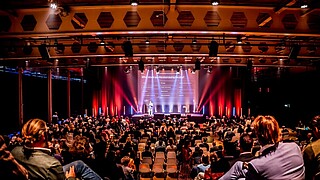“We want to use this event as a first step, a commitment to bringing our innovators together more often to inspire each other, and to encourage each other to dare to innovate,” said De Waard Leung in her welcoming words to attendees from RSM and Erasmus University Rotterdam. RSM InnovatED showcased RSM faculty’s innovation projects, to learn from each other and external innovation partners, and to inspire one-another to try different things and do things differently.
RSM InnovatED 2022 was dedicated to learning and teaching innovations around the themes of: EdTech, feedback literacy, alternative assessments, skills development, and gamification and experimentation.
Feedback is so forgettable
Focusing on developing a learning-focused feedback culture, keynote speaker Naomi Winstone, Professor of Educational Psychology at the University of Surrey set the tone with a remarkable statistic: feedback is forgettable. Students who receive feedback forget more than 80 per cent of that feedback within just five minutes, said Winstone. This shows there is plenty of scope for improvement in giving feedback.
Prof. Winstone described how feedback is often just a transmission of information from teacher to students. But for feedback to lead to learning, it needs to be about so much more than that. Effective feedback should be clear and inclusive with a focus on future development and opportunities for dialogue.
Designing feedback for learning
Prof. Winstone has developed an approach for feedback and assessment that incorporates preparation (points 1 and 2), assessment (points 3 and 4), and consolidation (points 5 and 6):
-
Clear and inclusive communication of assessment task requirements.
-
Opportunities to understand and discuss assessment criteria, such as live marking.
-
Timely feedback designed to support future work.
-
Forward-looking comments that focus on development.
-
Facilitating students’ use of feedback by giving comments a ‘landing place’. (for example to identify a place where they can apply those comments – this might not be immediate but it shows where it’s relevant)
-
Providing opportunities for dialogue, for example individually or as a group in a feedback webinar where they can talk about how to put them into practice).
The approach encourages zooming out from marking and providing feedback, and thinking about the whole student cycle.
“Feedback needs responsibility sharing. It needs 50-50 input from students and educators to make it effective,” said Winstone.
Help and resources
After Prof. Winstone’s presentation, attendees explored gamification, skills development, feedback literacy, and alternative assessments in a series of workshops for interacting with RSM’s innovation partners and learning about the awesome work they do and the help and resources they offer.
Attendees shared via Mentimeter how they would innovate by using what they had learned:
-
‘Keep it small and try out things without getting stuck in all the possible consequences.’
-
‘Think carefully about my purpose and how it helps the bigger picture.’
-
‘Push/pull forward in making assessment actually formative and/or pass/fail to reach levels. Summative only based on the portfolio ‘products’.
-
'By considering societal impact in study cases and serious gaming in education more often’
-
‘Max formative feedback (360), optimise summative (mid & end) assessment.’
“We hope that everyone enjoyed thinking through with us on ways to innovate in education and we look forward to seeing more of you at next year’s edition of RSM InnovatED,” said Anna de Waard-Leung. “We hope this conversation keeps going. Talk about ideas and challenges or brainstorm over a cup of coffee.”



